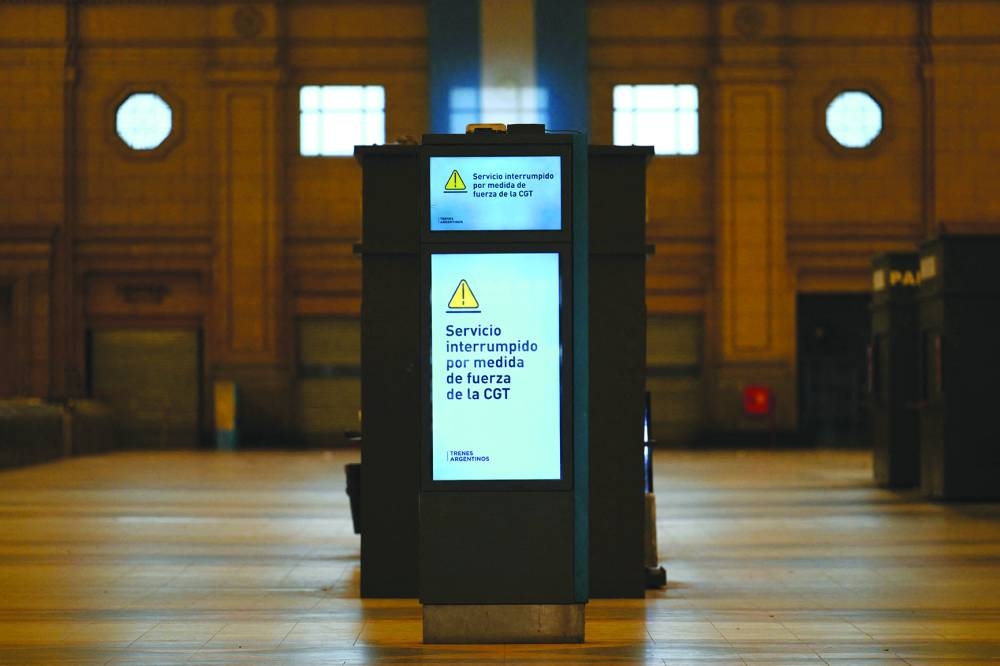Argentina’s President Javier Milei faced his second general strike in just five months in office, as workers angered by austerity cuts brought the capital to a standstill.
Public transport in Buenos Aires was reduced to a trickle for some 3mn daily commuters, while schools, banks and service stations remained closed, and garbage was left uncollected.
The 24-hour protest was called by labour unions in support of “a dignified wage” for Argentines battling a severe economic crisis, with annual inflation nearing 300% and poverty affecting one in two people.
Some 400 flights had to be cancelled, affecting about 70,000 passengers, according to the ALTA Latin American air transport association.
The port of Rosario, which exports 80% of Argentina’s agro-industrial production, was all but paralysed in the midst of its busiest season.
Self-declared “anarcho-capitalist” Milei won elections last November vowing to reduce the Argentine deficit to zero.
To that end, he has instituted an austerity programme that has seen the government slash subsidies for transport, fuel and energy, even as wage-earners lost a fifth of their purchasing power.
Thousands of public servants have lost their jobs.
The CGT union, part of Thursday’s strike call, accuses Milei of imposing “a brutal adjustment suffered especially by the lower-income sectors, the wage-earning middle class and pensioners”.
Just weeks after taking office in December, Milei faced his first general strike.
He has also been the target of numerous demonstrations organised by various economic and social sectors – the biggest so far on April 23 when an estimated 1mn people turned out to protest cuts to public universities.
Recent polls showed Milei’s popularity hovering between 45-50%, just short of his 56% of votes in his election win – a surprisingly high vote of confidence given the widespread unpopularity of his cost-saving measures.
The government has claimed some successes: monthly inflation has decelerated from 25% in December to a forecasted 9% for April.
In April, Milei boasted about Argentina’s first quarterly budget surplus in 16 years.
He insists his “plan is working” and has said the protests go “against what people voted five months ago.”
However, critics say that Milei’s few wins have come at the cost of the poor and working classes, and were unlikely to last.
There are worrying statistics as well.
Economic activity declined 3.2% year-on-year in February, and in March, there was a 21% annual slump in industrial manufacturing and a 42% dip in construction.
Leftist former president Cristina Kirchner said the austerity plan amounted to nothing less than a “useless sacrifice of the people”.
Hugo Yasky, secretary-general of the major CTA union, posted on X that the strike was against “a government that only benefits the rich at the expense of the people, gives away natural resources and seeks to eliminate workers’ rights”.
The government criticised the strike as unjustified and said it would simply hit people who wanted to work, something reflected on the quiet city streets in Buenos Aires.
“There are many people who want to work and obviously can’t get there, so they get a day’s pay deducted,” said Walter Fernandez, 44, a worker in Buenos Aires, though he said he himself was managing to get in on his bicycle.
Marcos Rivadero, a 47-year-old designer in the city, was more strident, calling the striking unions “extortionists”.
“They use the people, the people they claim to represent,” he said. “A ghost town, a city like this cannot function. A country cannot function like this with people who live off the state.”

An announcement on a screen reading ‘Service interrupted due to CGT force measure’ is seen at a closed Constitución train station in Buenos Aires during a general strike called by the
General Confederation of Labour (CGT).
